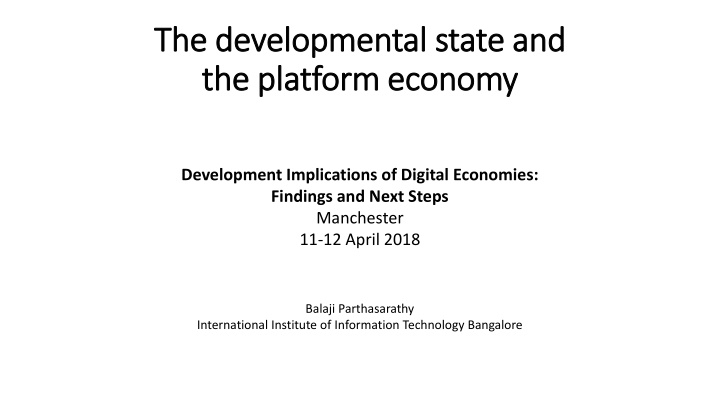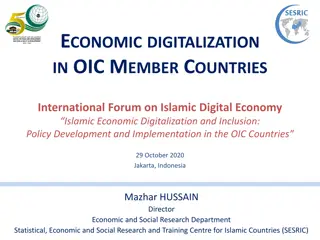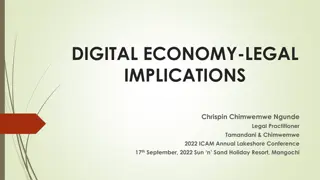Challenges and Opportunities in the Digital Economy: A Developmental Perspective
The presentation discusses the impact of technological advancements on labor, focusing on the developmental role of states in navigating this relationship. It highlights concerns about automation, deskilling, and the rise of flexible working arrangements enabled by ICTs. The shift towards task-oriented, mobile, and less secure work has implications for productivity and labor protections.
Uploaded on Oct 07, 2024 | 2 Views
Download Presentation

Please find below an Image/Link to download the presentation.
The content on the website is provided AS IS for your information and personal use only. It may not be sold, licensed, or shared on other websites without obtaining consent from the author.If you encounter any issues during the download, it is possible that the publisher has removed the file from their server.
You are allowed to download the files provided on this website for personal or commercial use, subject to the condition that they are used lawfully. All files are the property of their respective owners.
The content on the website is provided AS IS for your information and personal use only. It may not be sold, licensed, or shared on other websites without obtaining consent from the author.
E N D
Presentation Transcript
T The developmental state and he developmental state and the platform economy the platform economy Development Implications of Digital Economies: Findings and Next Steps Manchester 11-12 April 2018 Balaji Parthasarathy International Institute of Information Technology Bangalore
T The presentation he presentation The developmental role of the state, the developmental state, and the platform economy A historical overview of global concerns about the impact of technology on labour The developmental role of the state in navigating the relationship between technology and labour The role of the developmental state viz-a-viz online digital gig work illustrated through initiatives in Kenya & Nigeria
The concern: technological advancement and The concern: technological advancement and labour labour 47% of jobs in the U.S., 56% of jobs in Cambodia, Indonesia, the Philippines, Thailand and Vietnam, and 70%+ in India, Bangladesh, China, Cambodia, Nepal and Ethiopia are at high risk of being automated (ILO, 2017).
Automation and deskilling Automation and deskilling The most rapidly growing mass occupations in an era of scientific technical revolution are those which have least to do with science and technology because the purpose of machinery is to decrease the number of workers attached to it (Braverman, 1974:384) Automation will replace work that can be encoded in a programmable sequence (Castells, 2010:258) and expensive enough to be worth the investment in technology to replace them (Castells, 2010:266). Fragmentation of tasks leading to loss of craftsmanship, separation of conception from execution (Braverman, 1974)
L Labour abour and flexible working arrangements and flexible working arrangements Improved connectivity with improvements in ICTs has, in part, enabled flexible working arrangements with the following characteristics (Castells, 2010): - no fixed working time - task-oriented, no job stability - no fixed location of work - tenuous social contract between employer and employee Flexible work arrangements support mobility of capital viz-a-viz rigidity of labour (Castells, 2010) Productivity and profitability increases, labour loses institutional protection leading to individualization of labor in the labor process (Castells. 2010:282)
D Digital gig igital gig- -work as flexible work arrangement work as flexible work arrangement Digital gig work is a particular kind of flexible working arrangement Contingent (task- or project-based) intangible work delivered digitally and done for money, organised via online outsourcing platforms that are marketplaces bringing together buyers and sellers. Eg. AMT, Freelancer, Upwork etc. (Heeks, 2017:1) Tasks may vary from menial and monotonous parceled activities requiring some sort of judgment beyond the understanding of artificial intelligence (e.g. tagging photos, valuing emotions or the appropriateness of a site or text, completing surveys) to bigger and more meaningful works such as the creation of a logo, the development of a site or the initial project of a marketing campaign (De-Stefano, 2016:2)
Is the relationship between technology and Is the relationship between technology and labour labour inevitable? inevitable? Technological unemployment due to our discovery of means of economising the use of labour outrunning the pace at which we can find new uses for labour but this is a temporary phase of maladjustment (Keynes, 1933:3). The era of mass technological unemployment is not imminent no need for policies for a jobless economy - best strategy is not to slow technology but strive for flexibility, so that people, organizations and institutions can learn and grow their way into a healthy future (Brynjolfsson and McAfee, 2016) What can the state as an institution do in such a situation?
Addressing the concerns: the role of the state Addressing the concerns: the role of the state The relationship between technology and work can only be understood in complex interaction within a social system comprising management decisions, systems of industrial relations, cultural and institutional environments and government policies (Castells, 2010) The key concern for the government is how to adapt to technological changes and ensure socially acceptable standard of living for citizens i.e. how to play a developmental role to maintain legitimacy A developmental state sets substantive social and economic goals (Johnson, 1982:19), with a developmental ideology and a structure pertaining to the requisite institutions, norms and standards that can support the development process (UNESC, 2012)
The role of the state in advanced informational The role of the state in advanced informational societies (G societies (G- -7 countries) 7 countries) Countries show variations in their employment and occupational structures amidst a long-term decline in share of manufacturing employment (Castells, 2010). A Service Economy Model after 1970. eg. U.S.,U.K, Canada Industrial Production Model - reduced share of manufacturing employment but still a large share of labour force.eg. Japan, Germany These differences are due to different government policies and firms' strategies (Castells, 2010:246)
I Index ndex of employment of employment growth, 1973 growth, 1973- -1999 1999 High unemployment was a problem for some European countries. Technological innovation and diffusion did not have a direct impact at the aggregate level. Macro-economic policies and an institutional environment (including rigid labour markets) that discouraged private job creation were responsible (Castells, 2010) Thus, employment patterns in a country are dependent on state policy Source: (Castells, 2010 : 268)
Non-standard forms of employment arise out of flexible working arrangements which vary across countries Source : (Castells, 2010 : 288) Non-standard forms of employment in employed labour force in OECD countries, 1983-1994
Bangladesh Bangladesh high levels of high levels of informalization informalization Digital gig-work part of broader trend towards informalization of labour? Source: (Asian Development Bank & Bangladesh Bureau of Statistics, 2012:10)
T The developmental state and digital gig work he developmental state and digital gig work Investment in developing skills through education and opportunities for learning by doing provides employment opportunities for its citizens digital gig work being one of the options available when there is a lack of other local opportunities (UNESC,2012) D Cruz and Noronha (2016) suggest that, in India, Upwork provides employment and skill enhancement opportunities, specially for those in smaller cities Rather than a problem, digital gig worker emerges as a possible solution albeit with challenges How the solution emerges depends on the developmental model and the nature of the state: the developmental state is based on selected features, which can and need to be adapted to different conditions in time and space (UNESC, 2012)
Human resource capability Human resource capability In an age of global shift towards services, the comparative advantage of a country lies in its human resources. As Schultz proposes, investment in human capital through education and training to acquire knowledge and skills can increase human performance and earnings and thereby increase earnings, and, in turn, strengthen the economy and raise living standards (Law,2009) The World Bank (1993) considers investment in education as one of the key factors for the East Asian Miracle While employment is important, income security and job security are also important to ensure human development, necessitating regulation of the employment relationship
Regulation of the employment relationship Regulation of the employment relationship In digital gig work, key concerns viz-a-viz the employment relationship include: - non-recognition of the work and hence non-compliance with minimum wage laws, social security contribution, anti-discrimination regulation, sick pay and holidays (De-Stefano,2016) - lack of accountability of the platform providers a regulatory role of citizens on the Internet, will require information about a) who someone is (b) where they are, and (c) what they re doing (Lessig, 2006:23) of course, whether a part of cyberspace can be controlled depends on its code (Lessig, 2006)
Employment Employment Skilling and employment opportunities need to compliment each other to ensure that socially accepted standard of living is met State can either provide the infrastructure or actively intervene to ensure employment opportunities through digital gig work Ajira in Kenya and Naija Cloud in Nigeria are two active interventions undertaken by the state
The context- Kenya Source: https://www.africaresearchinstitute.org/newsite/publications/kenya-failing- create-decent-jobs/
The context - Kenya contd. Kenya has the highest informal sector employment in Africa In 2015, 83% of eligible workers in Kenya were employed in the informal sector, and jobs in the informal sector were growing at a higher rate than jobs in the formal sector According to the United Nations' Economic Commission for Africa Kenya is Africa's biggest supplier of online workers and tenth in the world, and the online work sector is fragmented and informal (https://www.businessdailyafrica.com) Ajira Digital was launched in 2016 as an online platform to enable young people to access online jobs and provide tools, training and mentorship to work and earn an income online (https://www.iafrikan.com) Ajira is an effort by the government to connect local skills with mainstream opportunities formalize the sector (https://www.businessdailyafrica.com)
The context The context - - Nigeria Nigeria Nigeria has Africa s largest population (approximately 174.5 million) and economy (more than $500 billion in annual GDP) A Ministry of Communication Technology was established in 2011, an ICT Policy developed in 2012, and a National Broadband Development Plan developed in 2013 The World Bank ICT/Education team worked with Nigeria s Ministry of Communication Technology and Federal Ministry of Education to leverage virtualized job opportunities to support job creation (http://blogs.worldbank.org)
The initiative The initiative NaijaCloud NaijaCloud - - Nigeria Nigeria The Microwork for Jobs - Naijacloud initiative was launched in all 36 states of Nigeria in March, 2013 to help create awareness about job opportunities available on Microwork and e-Lancing spaces in order to address the issue of youth unemployment which according to newspaper reports was at 60% It involved an awareness campaign carried out through a website, a Facebook page, a Twitter account and traditional media sources, a series of workshops that helped connect more than 1,000 potential workers to international microwork and freelancing organizations and workshops that helped acquaint approximately 60 local, regional and international companies and organizations with business opportunities for job creation on virtual platforms (http://blogs.worldbank.org)
Elance organized events that gave the companys leadership a chance to reach out to current employees, prospective clients and potential workers (http://blogs.worldbank.org) Naijacloud has trained up to 2,000 potential IT professionals in Lagos and Abuja under various platforms. After three weeks, they started earning money; now, we are moving to train 800 youths in each of the states - Mrs Omobola Johnson, Minister of Communication Technology, 17th June 2014 Thus, state policy in these emerging economies have looked at ICT as a means to provide employment and the skills required to enter the microwork and e-lancing space
Closing remarks Closing remarks Historically policies in all states have had an impact on the nature of employment in a society With the declining labour intensity in manufacturing emerging economies are looking at gig work as a means to enter the global value chain of services The policies of the developmental state in East Asian countries helped them to industrialize rapidly and catch-up with the developed countries through learning by doing They entered the global value chain of manufacturing at a low level and gradually moved up Digital gig work for allows for possible integration for other countries into the global value chain of services
Concluding remarks Concluding remarks Dilemmas for states How are the rights and independence of workers to be balanced? Will encouraging the gig economy bring workers into the formal sector?
References Asian Development Bank and Bangladesh Bureau of Statistics.(2012). The Informal Sector and Informal Employment in Bangladesh. Mandaluyong City, Philippines: Asian Development Bank. Braverman, Harry. (1974). Labour and Monopoly Capital. New York: Monthly Review Press. Castells, Manual. (2010). The Rise of the Network Society (2nd ed.). Chichester: Blackwell Publishing Ltd Richard Heeks (2017). Decent Work and the Digital Gig Economy: A Developing Country Perspective on Employment Impacts and Standards in Online Outsourcing, Crowdwork, etc. (Paper No. 71) Manchester: Centre for Development Informatics Global Development Institute.
DCruz, Premilla and Noronha, Ernesto (2016) Positives outweighing negatives: the experiences of Indian crowdsourced workers. Work organisation, labour & globalisation Volume 10, Number 1, Spring 2016.pp.44-63.Pluto Journals: London,UK. De-Stefano, Valerio. (2016). The rise of the just-in-time workforce : On-demand work, crowdwork and labour protection in the gig-economy . Geneva : International Labour Office International Labour Office.(2017). New Automation Technologies and Job Creation and Destruction Dynamics. Employment Policy Brief. Geneva :David Kucera Johnson, Chalmers. (1982). MITI and the Japanese Miracle. California: Stanford University Press Keynes, J.M. (1931). Economic Possibilities for our Grandchildren In Essays in Persuasion (pp. 358-373).New York: Harcourt Brace
Law,Wing-Wah. The Developmental State, Social Change and Education In Cowen, Robert Kazamias, Andreas M.(Eds) International Handbook of Comparative, Education.pp.257-277Institute of Education, University of London Lessig, Lawrence.(2006).Code Version 2.0.New York: Basic Books McAfee, Andrew, Brynjolfsson, Eric.(2016) Human Work in the Robotic Future: Policy for the Age of Automation. Foreign Affairs. 139 pp.139-150 The World Bank.(1993).The East Asian Miracle: Economic Growth and Public Policy.Oxford : Oxford University Press. United Nations Economic and Social Council(UNESC).(2013). The Developmental State: What Options for Africa? CGPP-III, Addis Ababa, Ethiopia.
Electronic sources https://www.africaresearchinstitute.org/newsite/publications/kenya- failing-create-decent-jobs/ http://blogs.worldbank.org https://www.businessdailyafrica.com https://www.iafrikan.com http://ilabour.oii.ox.ac.uk/where-are-online-workers-located-the- international-division-of-digital-gig-work/























